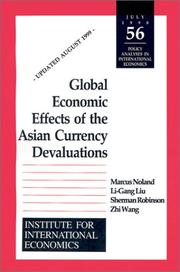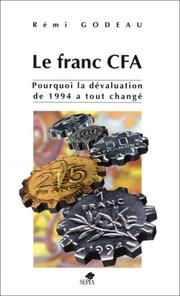| Listing 1 - 10 of 32 | << page >> |
Sort by
|
Book
ISBN: 9179005101 9789179005108 Year: 1988 Volume: 21 Publisher: Göteborg Göteborgs universitet. Nationalekonomiska institutionen
Abstract | Keywords | Export | Availability | Bookmark
 Loading...
Loading...Choose an application
- Reference Manager
- EndNote
- RefWorks (Direct export to RefWorks)
Devaluation of currency --- Tanzania --- Economic conditions --- -Currency devaluation --- Money --- Currency question --- Monetary policy --- Devaluation --- -Devaluation of currency --- -Tanzania --- Currency devaluation --- Devaluation of currency - Tanzania. --- Tanzania - Economic conditions - 1964
Book
ISBN: 9780452295834 Year: 2009 Publisher: New York ,New York Plume / Penguin Books Ltd
Abstract | Keywords | Export | Availability | Bookmark
 Loading...
Loading...Choose an application
- Reference Manager
- EndNote
- RefWorks (Direct export to RefWorks)
Zonder onderwerpscode: algemeen --- world crisis --- pandemic --- terrorist attack --- currency devaluation --- survivalblog.com --- surviving the end of the world
Book
Year: 2015 Publisher: Washington, D.C., The World Bank,
Abstract | Keywords | Export | Availability | Bookmark
 Loading...
Loading...Choose an application
- Reference Manager
- EndNote
- RefWorks (Direct export to RefWorks)
This article examines how economic shocks affect individual well-being in developing countries. Using the case of a sudden and unanticipated currency devaluation in Botswana as a quasi-experiment, the article examines how this monetary shock affects individuals' evaluations of well-being. This is done by using microlevel survey data, which-incidentally-were collected in the days surrounding the devaluation. The chance occurrence of the devaluation during the time of the survey enables us to use pretreatment respondents, surveyed before the devaluation, as approximate counterfactuals for post-treatment respondents, surveyed after the devaluation. Estimates show that the devaluation had a large and significantly negative effect on individuals' evaluations of subjective well-being. These results suggest that macroeconomic shocks, such as unanticipated currency devaluations, may have significant short-term costs in the form of reductions in people's sense of well-being.
Currencies and Exchange Rates --- Currency Devaluation --- Debt Markets --- Economic Shocks --- Economic Theory & Research --- Emerging Markets --- Fiscal & Monetary Policy --- Quasi-Experiment --- Subjective Well-Being
Book
Year: 2015 Publisher: Washington, D.C., The World Bank,
Abstract | Keywords | Export | Availability | Bookmark
 Loading...
Loading...Choose an application
- Reference Manager
- EndNote
- RefWorks (Direct export to RefWorks)
This article examines how economic shocks affect individual well-being in developing countries. Using the case of a sudden and unanticipated currency devaluation in Botswana as a quasi-experiment, the article examines how this monetary shock affects individuals' evaluations of well-being. This is done by using microlevel survey data, which-incidentally-were collected in the days surrounding the devaluation. The chance occurrence of the devaluation during the time of the survey enables us to use pretreatment respondents, surveyed before the devaluation, as approximate counterfactuals for post-treatment respondents, surveyed after the devaluation. Estimates show that the devaluation had a large and significantly negative effect on individuals' evaluations of subjective well-being. These results suggest that macroeconomic shocks, such as unanticipated currency devaluations, may have significant short-term costs in the form of reductions in people's sense of well-being.
Currencies and Exchange Rates --- Currency Devaluation --- Debt Markets --- Economic Shocks --- Economic Theory & Research --- Emerging Markets --- Fiscal & Monetary Policy --- Quasi-Experiment --- Subjective Well-Being

ISBN: 0881322601 Year: 1998 Publisher: Washington Institute for International Economics
Abstract | Keywords | Export | Availability | Bookmark
 Loading...
Loading...Choose an application
- Reference Manager
- EndNote
- RefWorks (Direct export to RefWorks)
Devaluation of currency --- 332.414 --- 333.481 --- 333.844 --- ASI / Asia - Azië - Asie --- Currency devaluation --- Money --- Monetaire crisissen, hervormingen, saneringen en stabilisering --- Devaluatie en opwaardering. Stabilisering. J curve --- Devaluation --- International finance --- Asia --- Currency question --- Monetary policy
Book
ISBN: 0262040832 9780262040839 Year: 1986 Publisher: Cambridge MIT Press
Abstract | Keywords | Export | Availability | Bookmark
 Loading...
Loading...Choose an application
- Reference Manager
- EndNote
- RefWorks (Direct export to RefWorks)
Devaluation of currency --- 333.825 --- 333.844 --- AA / International- internationaal --- GH / Ghana --- ID / Indonesia - Indonesie --- IN / India - Inde --- Currency devaluation --- Money --- Currency question --- Monetary policy --- Deviezenpolitiek. Interventies --- Devaluatie en opwaardering. Stabilisering. J curve --- Devaluation --- Devaluation of currency - India --- Devaluation of currency - Indonesia --- Devaluation of currency - Ghana

ISBN: 2907888404 Year: 1995 Publisher: Paris Sepia
Abstract | Keywords | Export | Availability | Bookmark
 Loading...
Loading...Choose an application
- Reference Manager
- EndNote
- RefWorks (Direct export to RefWorks)
Devaluation of currency --- French franc area --- Monetary policy --- 333.432.2 --- AA / International- internationaal --- AFR / Africa - Afrika - Afrique --- FR / France - Frankrijk --- Monetary management --- Franc area, French --- Zone franc --- Currency devaluation --- Money --- Frankgebied --- Devaluation --- International finance --- Africa --- Economic policy --- Currency boards --- Money supply --- Monetary unions --- Currency question
Book
ISBN: 0881651249 Year: 2000 Publisher: Princeton International Finance Section
Abstract | Keywords | Export | Availability | Bookmark
 Loading...
Loading...Choose an application
- Reference Manager
- EndNote
- RefWorks (Direct export to RefWorks)
Devaluation of currency --- Economic stabilization --- Fiscal policy --- Inflation (Finance) --- Monetary policy --- 330.05 --- 339.50981 --- 333.46 --- 333.481 --- 333.825 --- 333.844 --- BR / Brazil - Brazilië - Brésil --- Currency devaluation --- Money --- Monetaire toestand en evolutie --- Monetaire crisissen, hervormingen, saneringen en stabilisering --- Deviezenpolitiek. Interventies --- Devaluatie en opwaardering. Stabilisering. J curve --- Devaluation --- International finance --- Brazil --- Currency question

ISBN: 9071617041 Year: 1987 Publisher: Amsterdam NEHA
Abstract | Keywords | Export | Availability | Bookmark
 Loading...
Loading...Choose an application
- Reference Manager
- EndNote
- RefWorks (Direct export to RefWorks)
History of the Low Countries --- anno 1930-1939 --- Monetary policy --- -Devaluation of currency --- -NL / Netherlands - Nederland - Pays Bas --- 331.156 --- 333.421.1 --- Currency devaluation --- Money --- Currency question --- Monetary management --- Economic policy --- Currency boards --- Money supply --- Geldwezen van 1914 tot 1945. --- Gouden standaard. --- Devaluation --- Netherlands --- Economic conditions --- -Monetary policy --- -History of the Low Countries --- NL / Netherlands - Nederland - Pays Bas --- Geldwezen van 1914 tot 1945 --- Gouden standaard --- Devaluation of currency
Book
ISBN: 1451916329 1462352758 1282842714 145187197X 9786612842719 1452730903 Year: 2009 Publisher: Washington, D.C. : International Monetary Fund,
Abstract | Keywords | Export | Availability | Bookmark
 Loading...
Loading...Choose an application
- Reference Manager
- EndNote
- RefWorks (Direct export to RefWorks)
This papers estimates the equilibrium exchange rate for Armenia using three different approaches: the purchasing power parity (PPP) approach, the behavioral equilibrium exchange rate (BEER) approach, and the external sustainability (ES) approach. All three approaches suggest that the dram was overvalued by about 20–30 percent prior to the devaluation of the dram in March 2009.
Finance --- Business & Economics --- International Finance --- Foreign exchange rates --- Devaluation of currency --- Currency devaluation --- Money --- Exchange rates --- Fixed exchange rates --- Flexible exchange rates --- Floating exchange rates --- Fluctuating exchange rates --- Foreign exchange --- Rates of exchange --- Devaluation --- Rates --- Currency question --- Monetary policy --- Foreign Exchange --- Production and Operations Management --- Price Level --- Inflation --- Deflation --- Macroeconomics: Production --- Currency --- Macroeconomics --- Real exchange rates --- Productivity --- Purchasing power parity --- Real effective exchange rates --- Production --- Industrial productivity --- Armenia, Republic of
| Listing 1 - 10 of 32 | << page >> |
Sort by
|

 Search
Search Feedback
Feedback About
About Help
Help News
News